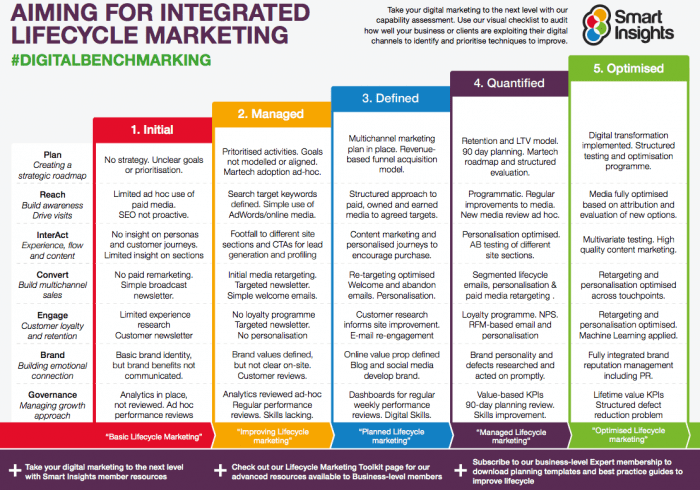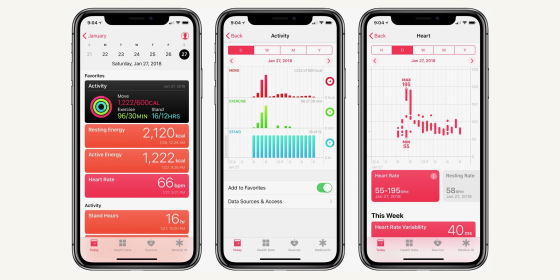The importance of creating and using a digital marketing plan to support digital transformation and company growth
Where do you start if you want to develop a digital marketing strategy? It’s a common challenge since many businesses know how vital digital and mobile channels are today for acquiring and retaining customers. Yet they don’t have an integrated plan to grow and engage their audiences effectively. They suffer from the 10 problems I highlight later in this article and are losing out to competitors.
The challenges of creating a digital marketing strategy?
In my experience, a common challenge is where to start drawing up your digital marketing plan. I think there is a fear that a massive report is required, but we believe that lean planning works best. Your plan doesn’t need to be a huge report, a strategy can best be summarized in two or three sides of A4 in a table linking digital marketing strategies to SMART objectives within our RACE planning framework.
Another challenge is the sheer scope and scale of digital marketing. There are so many great digital marketing techniques ranging from search, social and email marketing to improve the digital experience of your website. Our article, What is digital marketing? shows how by using our RACE planning framework you can define a more manageable number of digital marketing activities which cover the full customer journey. Within each digital marketing technique, there are lots of detailed tactics that are important to success, so they need to be evaluated and prioritized, for example from dynamic content for email automation, website personalization to programmatic, retargeting and skyscraper content for organic search.
A recommended approach for developing a digital strategy
Whether you have a strategy or not, at the heart of the Smart Insights ‘Opportunity, Strategy, Action‘ approach to improving digital marketing, is benchmarking to compare where you are now to assess the potential against where you need to be in the future.

But what if you’re one of the companies that don’t have a digital strategy yet? Well, I think the two simple alternatives for creating a plan may suggest a way forward:
- Start with a separate digital marketing plan defining transformation needed and making the case for investment and changes to your digital marketing
- Then, following approval, create an integrated digital plan which is part of the overall marketing plan – digital is fully aligned and becomes part of business as usual.
So, what are the takeaways to act on here? It seems to me that:
- Using digital marketing without a strategic approach is still commonplace. I’m sure many of the companies in this category are using digital media effectively and they could certainly be getting great results from their search, email or social media marketing. But I’m equally sure that many are missing opportunities for better targeting or optimization, or are suffering from the other challenges I’ve listed below. Perhaps the problems below are greatest for larger organizations who most urgently need governance.
- The majority of companies in our research do take a strategic approach to digital. From talking to companies, I find the creation of digital plans often occurs in two stages. First, a separate digital marketing plan is created. This is useful to get agreement and buy-in by showing the opportunities and problems and map out a path through setting goals and specific strategies for digital including how you integrated digital marketing into other business activities. Second, digital becomes integrated into marketing strategy, it’s a core activity, “business-as-usual”, but doesn’t warrant separate planning, except for the tactics.
If you don’t have a strategy, or maybe you want to review which business issues are important to include within a strategic review, we’ve set out the 10 most common problems, that in our experience arise if you don’t have a strategy.
Do you have a digital marketing strategy?
Since 2012 we have run an informal poll to see how widely used digital marketing strategies are. The results have shown some big improvements over the years. A few years ago we found around two-thirds to three-quarters did not have a digital marketing plan. Now that number has shrunk to 45% in latest survey, although that is still quite high, and means almost half are still doing digital with no strategy in place.

So, our latest research suggests an improved approach to planning in this sample of marketers, with fewer than half without a digital strategy. Congratulations if you’re one of these companies! If not, read on.
10 reasons why you may need a digital channel strategy?
1. You’re directionless
I find that companies without a digital strategy (and many that do) don’t have a clear strategic goal for what they want to achieve online in terms of gaining new customers or building deeper relationships with existing ones. And if you don’t have goals with SMART digital marketing objectives you likely don’t put enough resources to reach the goals and you don’t evaluate through analytics whether you’re achieving those goals.
2. You won’t know your online audience or market share
Customer demand for online services may be underestimated if you haven”t researched this. Perhaps, more importantly, you won’t understand your online marketplace: the dynamics will be different to traditional channels with different types of customer profile and behaviour, competitors, propositions, and options for marketing communications. There are great tools available from the main digital platforms where we can find out the level of customer demand, we recommend doing a search gap analysis using Google’s Keyword planner to see how you are tapping into the intent of searchers to attract them to your site, or see how many people interested in products or services or sector you could reach through Facebook IQ.
3. Existing and start-up competitors will gain market share
If you’re not devoting enough resources to digital marketing or you’re using an ad-hoc approach with no clearly defined strategies, then your competitors will eat your digital lunch!
4. You don’t have a powerful online value proposition
A clearly defined online customer value proposition tailored to your different target customer personas will help you differentiate your online service encouraging existing and new customers to engage initially and stay loyal. Developing a competitive content marketing strategy is key to this for many organizations since the content is what engages your audiences through different channels like search, social, email marketing and on your blog.
5. You don’t know your online customers well enough
It’s often said that digital is the “most measurable medium ever”. But Google Analytics and similar will only tell you volumes of visits, not the sentiment of visitors, what they think. You need to use other forms of website user feedback tools to identify your weak points and then address them.
6. You’re not integrated (“disintegrated”)
It’s all too common for digital marketing activities to be completed in silos whether that’s a specialist digital marketer, sitting in IT or a separate digital agency. It’s easier that way to package digital marketing into a convenient chunk. But of course, it’s less effective. Everyone agrees that digital media work best when integrated with traditional media and response channels. We always recommend developing an integrated digital marketing strategy and once Digital Transformation is complete digital marketing activities will be part of your marketing plan and part of business as usual.
7. Digital doesn’t have enough people/budget given its importance
Insufficient resource will be devoted to both planning and executing e-marketing and there is likely to be a lack of specific specialist e-marketing skills which will make it difficult to respond to competitive threats effectively.
8. You’re wasting money and time through duplication
Even if you do have sufficient resource it may be wasted. This is particularly the case in larger companies where you see different parts of the marketing organization purchasing different tools or using different agencies for performing similar online marketing tasks.
9. You’re not agile enough to catch up or stay ahead
If you look at the top online brands like Amazon, Dell, Google, Tesco, Zappos, they’re all dynamic – trialling new approaches to gain or keep their online audiences.
10. You’re not optimizing
Every company with a website will have analytics, but many senior managers don’t ensure that their teams make or have the time to review and act on them. Once a strategy enables you to get the basics right, then you can progress to continuous improvement of the key aspects like search marketing, site user experience, email and social media marketing. So that’s our top 10 problems that can be avoided with a well thought-through strategy.
So, the good news is that there are powerful reasons for creating a digital strategy and transforming your marketing which you can use to persuade your colleagues and clients. There is also now a lot of experience from how other businesses have successfully integrated digital marketing into their activities as explained in the example digital plans, templates and best practices in our digital marketing strategy toolkit.









Customer Co-Creation Examples: 10 Companies Doing It Right
IoT 2022 in review: The 10 most relevant IoT developments of the year
Everything You Need to Know About the Principles and Types of Design
Tech companies laying off workers after pandemic hiring sprees
Tech companies laying off workers after pandemic hiring sprees
IoT 2022 in review: The 10 most relevant IoT developments of the year
How to Leverage Social Media for Digital Transformation
Coronavirus has revealed the power of social networks in a crisis